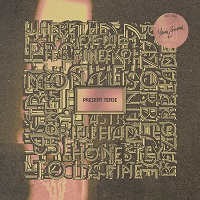Interview with Yumi Zouma about “Present Tense”
NeoL / 2022年10月24日 17時0分
9月にジャパン・ツアーを開催したユミ・ゾウマ。2年前に出演が決定していたフジ・ロックがコロナの影響で中止となり、かれらのライヴが日本で行われたのは2016年の初来日以来となる6年ぶりのこと。「ずっと待たされていた感じだった」と話すヴォーカルのクリスティだが、一方、先立ってこの春にリリースされたかれらの最新アルバム『Present Tense』は、そんなパンデミックによる環境の変化が創作に与えた影響を色濃く反映した作品となった。これまでのドリーム・ポップやシンセ・ポップとはテイストを変え、管弦楽器を配したオーケストラ・アレンジやクリーンなプロダクションが映えるサウンド。加えて、この間にかれらや身の回りに起きたさまざまな出来事に触発されたリアルで内省的な歌詞が、作品全体のトーンを特徴づけている。以下、今回のアルバムについて語るかれらの言葉は、その制作がもたらした実りの大きさを窺わせるように熱を帯びていて饒舌だった。(→ in English)
――今まさにツアー中ということで、久しぶりに日常――ミュージシャンとしてのルーティンが戻ってきたところだと思いますが、感触はいかがですか。
ジョシュ「いい気分だよ。2年間まったく何もしてなかったのに、今はいろいろなことがたくさんできるようになったのは不思議な感じがする。スケジュールの再調整は大変だったけど、日本のような場所に戻ってこられて、ファンの前でプレイできるのは信じられないことだよ。最高だね」
クリスティ「2020年のフジ・ロックで来るつもりだったので、ずっと待たされていた感じでした。(パンデミックで)中止になってしまい、その他の予定もキャンセルになってしまったので、いつ日本に来られるようになるののかわからなかった。だからようやく戻ってこられて、とてもシュールな気分です」
オリヴィア「2人と同じ。いい意味であっけにとられている(笑)」
――前作の『Truth or Consequences』がリリースされた直後にパンデミックが宣言されて、世界中がロックダウンに入ってしまったわけですが――。
オリヴィア「(WHOがパンデミックを宣言したのが)アルバムのツアーが始まって3公演目ぐらいのタイミングで。ロンドン、D.C.、それからニューヨークでライヴをやったところでした」
クリスティ「とてもショックでした。当時はいろいろなことがありすぎて、パンデミックがいつまで続くかもわからなかったし。ツアーは終わらせないといけないと言われましたが、ただ、アルバムに関してはいい機会だと思ったんです。みんな誰もが家のなかにいたので、家で音楽をたくさん聴いているひとたちが私たちのアルバムを聴いてくれるんだろうって。そういう意味で明るい兆しもありました」
ジュシュ「クリスティが言ったように、“あるタイミング”を失ってしまったことに気づくまで1年くらいかかった。当時はすべてがものすごい速さで動いていたので……ただ、その後で僕自身、あのアルバムが“ある時期”によって定義されていることに気づき始めた。『(自分たちの音楽が)あの辛い時期に心を癒してくれた』という嬉しいメッセージをもらったりして、そんなファンの心遣いにとても感謝しているよ」
――ツアーができなかったことも大きかったと思いますが、新しいアルバムの『Present Tense』はバンドにとって変化を象徴する作品で、サウンドはもちろん制作のアプローチもそうだし、パンデミックをへて芽生えた意識の変化が投影されているという意味でもそうだと思います。リリースされて半年ほど経ちましたが、あらためて自分たちの実感としてはいかがですか。
ジョシュ「アルバムを作っている間は、ツアーができる保証も、生活が元に戻る保証もなかった。でも、そのおかげでプロセスを楽しむことができるようになった。結果を出すために音楽を作るのとは対照的に、純粋に音楽を作ることができたんだ。リリースのことやその後のツアーのことを考えたり、そういうサイクルのなかにいるといろいろなことが起こる。ただ、そうしたすべてを取り払えば、その日スタジオにいること、物事に取り組むことを楽しむことができる。そのおかげで、また音楽を作るというプロセスに没頭することができたんだと思う」
クリスティ「通常、私たちの生活のなかで1年というのは、以前ならツアーが多くを占めていて、作曲やレコーディングもこなしつつ、その2つがバランスよく混じり合っていました。でも今回は、100パーセント、新曲に集中することができた。いつまたライヴをやれるかわからない状況で、自分たちにできることはそれしかなかったし、だからこそ自分たちのできる最高のものであることを確かめたかった。普段は気にする暇もないような細部にまで気を配ったし、その差は大きいと思います。それと、他のミュージシャンに声をかけてレコーディングに参加してもらったことも大きい。ストリングスやチェロなど、これまであまり試してこなかった楽器を使うこともできた。とにかく時間がありすぎるほどたっぷりあったので(笑)」
――今回のアルバムではメンバー全員がソングライティングに関与していて、ただ反面、意見をまとめるのが大変だったと聞きます。パンデミックの影響でリモートでの作業が多かったそうですが、なんでも解散寸前まで揉めたとか?
ジョシュ「(笑)大変だったのは、僕たちがバラバラになってしまったことにあると思う。僕たちはみな、普段は別々の都市や国(※ニューヨーク、ロンドン、クライストチャーチ、ウェリントン)に住んでいて。でもいつものレコーディングだったら、関係がピリピリしたときも一緒にコーヒーショップに集まって、顔を見ながらお互いの様子を感じることでそれを打ち消すことができる。ただ、『コーラスはこうしたらいいと思うんだけど……』とかタイピングしながら言い合ったりする場合、やっぱりどうしてもいろいろと難しくてね。けれどこうしたことは僕たちだけの問題ではなく、職場の人間関係や友人関係においてもみんなそうなんじゃないかな。一緒にいることを奪われるのは、ただただつらいだけなんだ」
クリスティ「普段一緒にいるときは、50パーセントは音楽活動、50パーセントは友人として過ごして友情を育んでいます。でも、そういう側面を取り除かれてしまうと、アルバムを仕上げるための時間しかなくなる。みんな忙しいスケジュールで動いているし、本業の仕事もある。そこが今回、とても難しいことでした。だからこそ、私たちは友情を維持する方法を見つけ、コミュニケーションをとって、そうした困難を乗り越えていかなければなりませんでした」
――ちなみに、収録曲はそれぞれ5〜7種類のヴァージョンが制作されたというのは本当ですか。
クリスティ「何曲かはそうですね。今までのやり方は、このアルバムでは通用しないことに気づいたんです。ただ、あの状況では自分たちが何を求めているのか、同じ目線に立って互いに伝えるのは困難なことでした。なので、どのヴァージョンを選ぶか、そのつど難しい決断を迫られました。最終的にどのヴァージョンにするかは、フェイスタイムで長い間話し合って決めました」
ジュシュ「いろいろなヴァージョンがあるということは、つまり無限の選択肢があるということ。そして前に進むためには、そこで選択を迫られることになる。ただ、アルバムを完成させられる保証もなく、レコードをリリースするタイミングもわからない不確実な時期に音楽を作るのは難しい部分があった。例えば“Astral Projection”はレゲエ・ヴァージョンにしようか、それともインディ・ロック・ヴァージョンにしようか……その決断を下すには、明確なゴール地点があることが大事な場合もあるわけで」
――今回のアルバムでは、チェロやペダルスティール、ピアノ、サックス、ウッドウィンズなど様々な楽器をサポートで参加したミュージシャンが演奏していますが、このアイデアはどこから生まれたのでしょうか。
ジョシュ「自分ではコントロールできないような、異なるテクスチャーを見出したかったんだと思う。他のひとに演奏してもらうと、その人の表現力が加わって、自分ではできないようなことができるからね」
クリスティ「このアルバムでは、リアルな楽器やオーガニックなサウンドの世界を探求したかった。逆に、前のアルバムはすべてがデジタル化された世界にどっぷりと浸かった作品でした。そこから、リアルな音と繋がりたいと思うようになって――私たちが一緒にいることができず、すべてを遠隔でレコーディングしなければならないという状況もあって。だから地球の反対側にいる誰かに連絡して、録音したものを送ってもらうことにしました。新しいことを試すのによい方法だったと思うし、それはある意味、前のアルバムを受けて自分たちがやりたかったことの延長線上にあるような気がしました」
――なるほど。
ジョシュ「それと、このアルバムはすべての曲でオリヴィアが本物のドラムを叩いている初めてのアルバムなんだ。ドラムマシンは使われていない。『Truth or Consequences』やそのツアーでは少し物足りなさを感じていたから、オリヴィアにできるだけ参加してもらいたかった。それで4人で集まって、その感覚をアルバムに反映させたかったんだ」
オリヴィア「その気にさせてくれたんです(笑)。ジョシュとチャーリー(・ライダー、B/G)と一緒にスタジオで過ごし、ニュージーランドのウェリントンで行ったセッションは本当に最高の時間でした」
ジョシュ「今はテクノロジー的にとても恵まれた時代でもある。もしも10年前にパンデミックが起こっていたら、もっと大変なことになっていただろうね。それと、僕らはいつも離れて暮らしていたので、遠隔地での共同作業を行う素養があったのも大きかった。これまでの音楽制作の経験から、直感的にそのようなスキルを備えていたのかもしれない。だからすべてをリモートで行うことにそれほど違和感はなかった。そうして過去に少しずつやってきたことがうまく機能したんだと思う」

――先ほど話してくれた「リアルな楽器やオーガニックなサウンドの世界」という部分に関して、参考にしたアーティストやレコードは何かありましたか。
オリヴィア「ドラムについてはフリートウッド・マックの『噂』とか」
ジョシュ「そうだね。あと、僕たちはみな、アーサー・ラッセルの大ファンなんだよ。今回チェロをたくさん散りばめたのは、そこから来てるんだと思う。とくにヴォーカルとチェロの関係――たとえば“If I Had The Heart For Chasing”では、クリスティの低い声とチェロがオーガニックな雰囲気を醸し出している。そうした自分たちがいつもよく聴いているものを参考にして、それらをすべてミキサーにかけてスムージーにしているんだよ」
――今回ミキシングは複数のプロデューサーが手がけていますが、かれらはこれまでにワイズ・ブラッドやジュリア・ホルター、グリズリー・ベア、チェアリフトといったアーティストと仕事をしてきた経歴の持ち主です。例えば今作で特徴的な管弦楽器のアレンジやオーケストレーションを考えたとき、そうした経歴も考慮してかれらに声をかけた部分もあったのでは?と思ったのですが、いかがですか。
ジョシュ「そこはタッチポイント(顧客接点)みたいなもので、つまり自分たちがヘヴィメタルのひとを探しに行くことはないという。アッシュ・ワークマン(M1、3、8、9)はメトロノミーやクリスティーヌ&ザ・クイーンズといろいろなことをやっている。ケニー・ギルモア(M2、4、6)はジュリア・ホルターやワイズ・ブラッド、アリエル・ピンクと一緒に仕事をしたことがあって。それにジェイク・アロン(M5、7、10)は過去に僕らの作品にもたくさん参加してくれている。面白かったのは、アッシュ・ワークマンのミックスがもっとワイルドなものになると思っていたら、結果的にオーガニックなものになったことかな。ケニー・ギルモアのミックスはパンチの効いたものになった。そしてジェイクはいつも完璧に仕上げて、僕らの求めるものを理解してくれる。だからオーガニックな曲を入れても、それがクリスティーヌ&ザ・クイーンズのようなサウンドになることはないんだよね」
クリスティ「補足すると、60年代や70年代にインスパイアされた、ちょっとヴィンテージなサウンドの曲をケニー・ギルモアに任せたら、ヴィンテージ・ポップのようなサウンドになると思っていたんです。けれど想像に反して、もっとモダンなサウンドに仕上がりました。かれはミックスによって何を取り出すべきかを『選択』したんだと思います。かれは、どんな曲であってもその曲の一番いいところを見つけるのが本当にうまいサウンド・エンジニアなんです。私たちは今回、ある意味、白紙の状態で臨みました。なので、どんな音にしたいとか、そういうことはかれらに言いませんでした。『これはこういう曲だから、これが一番いい音になると思うものをやってくれ』というだけで。もちろん、かれらが手がけてきたアーティストが好きだから選んだという部分もある。でも、それが必ずしも私たちのサウンドの仕上がりに影響したわけではありません」
――歌詞についてはどうですか。以前はもっとロマンチックな内容の歌詞が多かったですが、今回のアルバムではより現実的で地に足の着いたテーマについて歌われている印象を受けます。
クリスティ「興味深い意見ですね。それは私たちがその時々にいた環境の産物だと言えると思います。この間の状況のなかで、幸せや愛について書かれたアルバムを出すのは正しいことだとは思えなかった。私たちが過ごしたこの時期はかなり深刻で、私たちはみな、とてもつらい状況や人間関係を経験しなければなりませんでした。それが結果的に音楽に反映され、より感情的な深みを持たせるために、それらの曲にもっと意味を持たせたいと思うようになったんだと思う。これまでの私たちにとっての音楽は、『楽しい曲を作ろう』という単なるはけ口だったと思う。パンデミック前にこのアルバムを始めたときは、そんなふうにたぶん道を間違えていたんです。そして、いざ完成させようとなったとき、パンデミックのさなかで私は、軽薄なものに取り組んでいるのが馬鹿らしくなってしまった。私たちは何も考えずに、そのような気持ちや感情を表現したいと思う気持ちが自然と湧いてきたんです」
ジョシュ「今回は『失うものは何もない』という感じだったね。僕らが感じていたことや経験してきたことは、けっして僕らだけのものだとは思わない。おそらく多くのひとも正直な会話をして、自分の内面を見つめ、そして何らかのかたちでアウトプットしていたような気がするんだ」
クリスティ「それは“完全な内省の期間”といった感じでしょうか。今回、私たちが取り組んだ歌詞は、これまで書いていないようなものが多かったと思う。これまでの私たちは、パンデミック前の過去のシナリオで悲しかったことやつらかったことを歌っていたのかもしれません。ただ、この間に私たちが経験した悲しいことを歌にするためには、そうした内省の時間が必要でした。私たちは、みなが感じていることを言いたかったのであって、すべてが順調であるかのように主張したくはなかった。それはきっと誰もがそうだったと思うし、実際、本当にそうだったのですから」
ジョシュ「僕たちは普通の人間で、日々の生活や仕事などさまざまなことがある。いろんな意味で、今回のアルバムが一番リアルに僕らを映し出していると思う。今までの作品はあまりシリアスではなく、逃避的なものだったのかもしれない」
――“In The Eyes Of Our Love”には、「裂けた唇でベンセレーモス(※70年代に作られたチリの革命家)を口ずさむ」というフレーズがありますね。
クリスティ「これはチャーリーが書いた歌詞なんです。かれは歴史の小さな断片や歴史的な物語を見つけるのが好きで。この曲では60年代や70年代のチリで起こった歴史的出来事について触れていて、かれはこの曲のなかで具体的な言及をたくさんしてくれました。いつもの私たちのスタイルとは違うけど、でもこの曲はふさわしいと感じました。今の世界の政治的な状況にも適していると感じたし、革命やプロテスト、正しいことのための戦いについて語ることは私たちが共鳴するところです」

――この2年間に限った話ではないですが、パンデミックで社会が混乱する一方で、近年はさまざまな抗議の声が世界の至る場所で上がっています。そうした情勢に触発される形で、今回のアルバムの歌詞が現実的でシリアスなトーンに変化したという部分もあるのでしょうか。
ジョシュ「そうだと思う。チャーリーを代弁することはできないけど、そこはとても微妙に混ざり合っていると思うんだ。とくにアメリカに住んでいると、抗議活動の多くは、聞くことと同じくらいに、自分自身の意見をそこに込めることでもあるから。だからある意味では、この曲はプロテストが自分を表現する正当な方法であることを証明するようなものだと。今はプロテスト・ミュージックについてもっとはっきりと考えるべき時期だと思う。だからこの曲は、他のひとたちの声が必要とする場所を奪おうとすることなく、その抗議の声に正当性を持たせるための、僕らなりの方法だった」
クリスティ「このアルバムの全体的なテーマだと思うんです。今までの私たちは、曲のなかにメッセージ性を求めてはいなかったんです。空白というか、どこか中途半端な感じがして、何かひとつのことを言うわけでもなかった。このアルバムには、つらい時期や特定の事柄についての歌詞がありますが、“Give It Hell”のような怒りについて書いた曲もある。その中核にあるのは『黙っているより、自分の声で正しいことのために戦おう』ということです。そしてそれは、『自分たちは声を上げられるのに、家で何もせずに座っている』という感覚から生まれてきたものでした。ブルース・スプリングスティーンに触発されたような曲もある。よりアップビートな曲にはそうしたテーマが込められていて、ビートの少ない曲では私たちが経験してきた個人的な葛藤について歌っています。私たちがこのアルバムに取り組んでいるときに巡っていたのは、この2つの感情でした」
――「Present Tense」というアルバムのタイトルはどのようにして決めたんですか。
ジョシュ「「Present Tense(=現在形)」には二重の意味合いがあって。パンデミックに巻き込まれた僕たちはみな、それまでの『日常』から切り離されてしまった。その結果、将来の利益よりも、自分が今楽しんでいること、自分の人生を有意義にしていることは何なのかを考えるようになった。同時にそれは、今という『この瞬間の緊張感』を表しているんだと思う」。
クリスティ「私たちは『緊迫した今』を生きていました。パンデミックや政治的な問題で世界中が緊迫しているなかで、このアルバムは私たちにとっての『瞬間(=現在形)』で構成されているんです。でも同時に、その場で起きていることだけではなく、私たちの過去の瞬間もこのアルバムにはたくさん反映させたかった。だから、今も過去も含めてその時々の瞬間をコラージュしたような感じなんです。あなたはいつも、今この瞬間にいて、そこに留まろうとしている。たとえ過去を見つめていたとしても、今この瞬間にいること、そしてマインドフル(※『今この瞬間』に注意を向けている心の状態)であることが重要なんです」

photography Marisa Suda(https://www.instagram.com/marisatakesokphotos/)
text Junnosuke Amai(TW)

YUMI ZOUMA(ユミ・ゾウマ)
『PRESENT TENSE(プレゼント・テンス)』
(ビッグ・ナッシング/ウルトラ・ヴァイヴ)
Now on Sale
日本盤ボーナス・トラック収録、解説付
■収録曲目:
1. Give It Hell
2. Mona Lisa
3. If I Had The Heart For Chasing
4. Where The Light Used To Lay
5. Razorblade
6. In The Eyes Of Our Love
7. Of Me And You
8. Honestly, It’s Fine
9. Haunt
10. Astral Projection
11. Grateful*
12. Jessica's Flat*
*日本盤ボーナス・トラック

―You released your new album in the spring and have resumed your tours. How does it feel to return to a routine as a musician?
Josh: We feel good. It was interesting not doing anything for two years and now doing lots. There was a lot of readjustment but it is incredible to come back to places like Japan and fly to see the fans. Feels great.
Christie: It feels like we have been waiting for a long time because we meant to come here in 2020 for Fuji Rock Festival. It got cancelled. We weren’t sure really when we would get to come back to Japan because things kept getting cancelled. It feels quite surreal to be back here finally.
Olivia: The same with Josh and Christine. It’s very surreal. It’s also very overwhelming in a very nice way.
―When the pandemic started, you released your third album, ‘Truth or Consequence’. With the pandemic and lockdown, was it a challenging period for you?
Olivia: We were three shows into the album tour. We played in London, D.C. and New York.
Christie: It was a shame. I feel like there was so much going on at that time and we didn’t know how long the pandemic would go for. We were told that the tour had to end but we saw it as a good opportunity because everyone was at home, stuck inside maybe listening to lots of music at home. They will be listening to our album more, so there was a silver lining.
Josh: as Christie said, it took about a year to realise that we had lost that moment. At the time everything was spinning so fast. For me, it was about a year later that I began to realise that this album was defined by the time. We had some nice messages that our music was a comfort during that hard time which was a nice thought of mind.
―Your new album, ‘Present Tense’ is special because it is about experiencing the time you could not make music together. You spent time developing the process and approach of making music. What are your thoughts about this change and how was it reflected in the album?
Josh: While we were making the album, there was no guarantee that we were able to tour or that life would return to what it was. It made me learn to enjoy the process. I was able to make music as opposed to making it for a result. Sometimes when you are in a cycle where you put a record out to go on a tour, come out and all these things can happen. If you take away all that as a guarantee, you are left with enjoying being in the studio that day and working on things. I think it made me sink back into the process.
Christie: Normally a year in our lives would be a lot of touring and some writing and recording. It would be a balance or a mix of the two. This time it was a hundred percent focused on the new music. We had no idea when we would play live music again. We had a hundred percent focus on the music and we wanted to make sure it was the best that we could do. This was also all we could do. We paid a lot more attention to details that we normally had no time to worry about. Usually, we are busy with other things. I think it makes a big difference. We also spent time finding other musicians play, their recordings, other strings, and instrumentations that we never experimented too much with. We had so much time to do it.
―You mentioned you experimented too much. You had so many opinions and found difficulty in combining them as a band. Even at some point, you were on the verge of separation. What do you think was challenging?
Josh: I think the one difficult thing was us being separated. We all live in different cities and countries. Normally we could gather at a coffee shop and see or feel each other’s energy. We could be hyping and saying “I think the chorus should be…”. It gets a little harder to get to that human understanding level. I don’t think that problem is just exclusive to us. People had that in their workplaces with their friendships and relationships. When you take away the ability to be together, it’s just harder.
Christie: When we are normally together, we do fifty percent working on music and fifty percent being friends, hanging out, spending time together working on our friendship. It just happens like that. When you take away that aspect, all you have time for is to finish the album. Everyone is working and have their day job. I think that’s what made it more difficult. It pushed us to find ways to maintain our friendship and communicate to work through those challenges.
―Is it true that each song in the album had five or seven different versions?
Christie: Some of them yes.
Josh: Yes.
Christie: I think that was when we realized that we experimented too much. We realized that how we worked in the past was not working for this album. It was too hard to communicate what we wanted ad to be on the same page. We had to make some hard decisions on what versions we choose. We had long conversations on facetime calls to decide the versions we would go with at the end.
Josh: There were lots of different versions and endless options. Sometimes just making a choice is just how it goes. You make a choice and you go down this route. We were making music in an uncertain time, where there was no guarantee that we could finish the album, it would come out if the record would say a good time to put it out.
Then you start to wonder what if 'Astral Projection' was a reggae song. Sometimes having a finish line where you can say no, "it will not be a reggae version" and continue with the indie version is important. But yes there are many different versions, similar to ‘Truth Or Consequences’ there are alternate versions. In the previous album, we released lots of different versions of the songs as an album.
―In this album, you utilized the cello, strings, piano and orchestral instruments for a slightly classic style. Where did this idea come from?
Josh: I think just wanting to find different textures that you’re not so in control of. When you have other people play, their expression comes and they add something that you just can’t.
Christie: Yes that you wouldn’t think of.
Josh: I think that was the main thing. Trying things we couldn’t do.
Christie: I think with this album we wanted to go into the world of real instruments, organic sounds. Olivia was playing real drums on every song. We wanted it to be less of the computer sounds and explore more real-life instruments which were naturally progressing from ‘Truth of Consequences'. I think we felt that album went a bit in that direction. In ‘Present Tense’ we are living in a world where everything is very digital. Over time we wanted to connect with real sounds, especially when we couldn’t be together and everything had to be recorded remotely. We could contact somebody at another end of the world and ask them to record something for us. It was a good way to try something new but was also a continuation of what we wanted to do from our previous album.
Josh: To make new friends as well. We were all craving new friends and new people.
Christie: The circle used to be very small. Now with every album, we find new collaborators and new people to mix and master. So it grows and it’s cool.
Josh: Yes. I think this is the first album that all is Olivia’s drums. There are no drum machines. We wanted Olivia to be as much part of it because we were feeling a bit robbed of ‘Truth and Consequences’ and touring. We wanted to come together as four people and have that reflected on the album.
Olivia: It surely made me feel like it. It’s great. We had some nice moments in the studio with Josh and Charlie doing some drumming sessions on board in New Zealand.
Josh: We were able to talk to her and watch her do it. So in some ways, it was an amazing time for technology. If the pandemic happened ten years ago it would’ve been a much harder challenge. I think what is quite interesting about us and how we made the record was that we always loved it with heart and always had an element of remote collaboration. I think we had some of that skill set intuitively based on how we made music in the past. It didn’t feel super foreign to do everything remotely. It wasn’t our preference, it’s always nice to have a bit of both but it served us well because we have done a bit of it in the past.
Christie: And we made it work.

―You mentioned texture and different sounds. Did you refer to any artists or albums in particular?
Olivia: With drums, I come back to Mickey and Rumors.
Josh: We have all been a big Arthur Russel fan. I think a lot of the saturated cello comes from there. The relationship between the voice and the cello with especially Christie’s lower voice.
In the song called ‘If I Had the Heart for Chasing’, a lot of the cello was about bringing the organic feel. I think we always reference things we are listening to and put it all in a blender and make it into a smoothie.
―You worked with different kinds of mixers. Everyone has a unique kind of expression. Some of these people were part of Weyes Blood, Grizzle Bear and Julia Holter. Is there a reason why you picked them?
Josh: I think that’s like a touch point, we wouldn’t go find a heavy metal person. Ash Workman has done a lot of stuff with Metronomy and Christine and the Queens. We had that sort of element. Kenny Gilmore has done stuff with Julia Holter, Weyes Blood and Ariel Pink. Jake Aron has done a lot of our stuff in the past. What was interesting was that we thought Ash Workman mixes would be the real bangy ones but they ended up being the more organic ones. Kenny Gilmore's ones became the punch ones and Jake always kills it, he understands what we want. It was a good way to remember that you only get out what you put in. You can’t put in an organic song and expect it to sound like Christine and the Queens.
Christie: To add to the point we thought if we give this song with a slightly vintage sound, the sixties or seventies-inspired song, and give that to Kenny Gilmore we expected it to come out sounding like a vintage pop feel. Instead, it came out with a modern feel. We assumed that it will be how it works because he’s done that for other people with those songs. I think he picked out what he thought should come out of the mix. He is a really good sound engineer to find the best bits of the song no matter what the song is. We kind of went with a blank set. We didn’t go and say what we wanted it to sound like. It was very much of “Here is the song, do what you think will sound the best”. I think we gave a few notes but this is how it was. We picked them because we liked the artists they worked for but that didn’t necessarily influence how it ended up sounding for us.
Olivia: It was surprising actually.
―The songwriting process changed and so did the lyrics. Before there were more romantic lyrics but for this album, they were more realistic and down-to-earth. Why do you think this shift emerged?
Christie: Interesting observation. I would say it was a product of where we were all at that time. It felt right to put out an album with lyrics about happiness and love. The times we were in were pretty serious and we all had to go through some pretty hard situations and relationships we were in. I think that just ended up reflecting on the music and wanting to put more meaning into those songs to have a more emotional depth. Music in the past for us has been about making a fun song with a bit of meaning to it. When we started this album before the pandemic, we were probably going the wrong way on the path. When we came down to finishing it during the pandemic, it felt silly or frivolous to be working on something. There was a natural desire to express those feelings and emotions we were going through.
Josh: It felt like there is nothing to lose this time. You know.
Christie: It felt like the right time to say some of the harder things and put a little bit more meaning into it.
Josh: I feel like in this record all the things we were going through were unique to us. I think there were a lot of people who had honest conversations and looked inside themselves.
Christie: It’s a forfeited period, that’s why. I think a lot of lyrics that we worked on were something I haven’t written about. Maybe they were about past scenarios before the pandemic that was sad and hard to go through. It felt like a time of reflection. I think everybody was reflective and feeling emotional. We wanted to say what everybody was feeling and not make a point as if everything was fine. It wasn’t how anyone was feeling and it was not what we felt.
Josh: We are just regular people. We have our day-to-day life and odds and stuff. In many ways, this is the most real reflection of us. Maybe our previous work was less serious and more escapist, with this is about us holding up in our way looking back.
―The song, ‘In the Eyes of Our Love’ was about a revolutionist, Venceremos. What did you intend to express from this reference?
Christie: This one was lyrics that Charlie had written. He loves to find little pockets of history and historical stories. He loves learning about things like this but it was the first time he had just written all these lyrics of this song about this saga that happened in the seventies, sixties Chile. When it came to putting it into the song, we felt like it wasn’t the usual style but also the right thing for the song. It felt right also because of the political state of the world. Now talking about revolution, protests and fighting for what is right is what we resonated with. He found so many specific references to put in there as well. I don’t know enough about it considering I’m singing about it but it's something different for us and good exposure. The song itself is a 1980s-inspired feeling, it felt perfectly classic to talk about history in the lyrics. He did that quite well actually.

―In the past two years of the pandemic, there have been various protests. Do you think such changes in the world have inspired your lyrics to shift away from your romantic lyrics?
Josh: I think so, I can’t speak for Charlie on that but I think it’s such a delicate mix. Living in the U.S. a lot of the protests is about listening. It’s about putting out your own opinions. So in some ways, the song is a validation of protests being a legitimate way to express yourself. I think it’s a time to be super explicit about protest music. For me, it felt like a really important time to listen as much as to speak. I think this was our way of putting validation to those protests without taking up the space for other people’s voices.
Christie: I think it’s an over-arching theme on the album. We didn’t want to go for any messaging in our songs. It felt blank or middle of the road. Not saying one or another thing. There are lyrics on the album about hard times and certain things but there is also a counter feeling of ‘give a hell’. It’s about fighting for what is right with your voice rather than sitting back. I think that came out of this feeling of ourselves sitting at home and doing nothing when we could use our voices.
When we were working on this album, it became these two feelings. I would say Bruce Springsteen had an influence on some of the songs in the album. The more upbeat ones have that theme and the ones with fewer beats are more about the personal struggles we were going through. It was the two emotions we were cycling through.
―The title of your album is ‘Present Tense’. How did you decide the title and what is the meaning behind it?
Josh: Tossing a lot of options. We have been shopping for a title and I just said ‘Present Tense’. I think because of the double entendre of present tense being in the moment. All of us in the pandemic has been taken away from our normal context. I started to think about what is it that I enjoy and what is it that makes my life meaningful now rather than a future gain. It is also about the tension of the present moment.
Christie: That’s why we liked it because it felt like we were living in a tense present at the time. It was tense for us and tense for the whole world with the pandemic and political struggles. It was also this idea that the album was made out of moments for us. It wasn’t an album about what was happening right there, it was reflecting lots of moments from our past. It felt like a collage of moments in time. We wanted something that reflected moments where we were in the present moment. You are always in your present moment and trying to stay with it. Even if we were looking into the past, it was really about being in the present and behind mindful.

photography Marisa Suda(https://www.instagram.com/marisatakesokphotos/)
text Junnosuke Amai(TW)
関連記事のまとめはこちら
https://www.neol.jp/music-2/
外部リンク
- クィア・アイコンAisho Nakajimaが新曲「LUNA」配信&MV解禁
- NUGAが復活する。 REDUX YAGI @O-EAST “NUGALON”
- Interview with Yumi Zouma about “Present Tense”
- 「ほとんどの曲はロックダウン中のイギリスで書かれたもので、その影響や余波がアルバムからは聴き取れると思う」Interview wtith Squid
- Hirakish来日。speedy lee genesisとリユニオンし、パーティー「Neoplasia4」を開催。「New Age Rockpopadelic」を記念しGR8でのポップアップストアも期間限定で開設
この記事に関連するニュース
-
Ringo Magazine Launches First Issue with an Exclusive NYC Celebration
PR TIMES / 2024年12月25日 14時45分
-
tHE GALLERY HARAJUKUにて、2025年1月2日(木)より、THEKLA KAISCHAURI個展「FRACTURED」を開催。
PR TIMES / 2024年12月25日 14時45分
-
UESHIMA MUSEUM ANNEX オープンのお知らせ ~ 2025年1月15日より、今津景展を開催
PR TIMES / 2024年12月23日 15時15分
-
Shareholder Proposals to Japan Business Systems, Inc.
PR TIMES / 2024年12月22日 14時40分
-
granumより東京都『TIB STUDIO』採択のご報告<English follows>
PR TIMES / 2024年12月11日 10時45分
ランキング
-
1ザ・ノンフィクション「57歳クズ芸人の婚活」をサポートした私…心から失望した“決定的な出来事”
日刊SPA! / 2025年1月9日 8時54分
-
2カルディで販売「ドライアプリコット」に使用不認可の添加物…… 企業が謝罪「心よりお詫び」 1万袋自主回収
ねとらぼ / 2025年1月8日 7時30分
-
3〈生存率15%から生還〉山﨑努が「食道がんステージ4」体験を初めて明かした《87歳で抗がん剤治療に踏み切れた理由》
文春オンライン / 2025年1月9日 8時30分
-
4ゆうちょ銀行で2025年から新設される「回収事務手数料」って何?
オールアバウト / 2025年1月7日 19時30分
-
52025年てんびん座の運勢・天秤座の占い
HALMEK up / 2025年1月5日 15時0分
記事ミッション中・・・
記事にリアクションする
![]()
記事ミッション中・・・
記事にリアクションする

エラーが発生しました
ページを再読み込みして
ください










